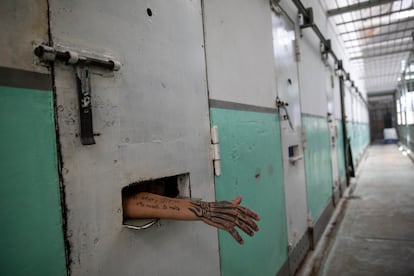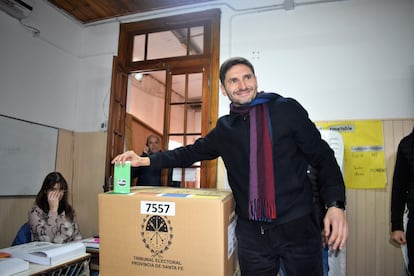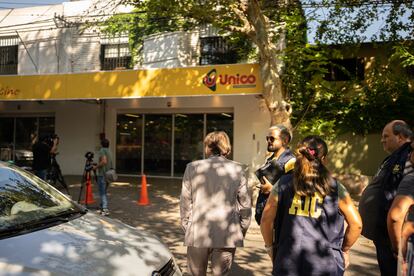Threats to a governor put spotlight on drug trafficking violence in Argentina
Maximiliano Pullaro, head of Santa Fe province, has taken his family out of Rosario due to the intimidation campaign against him

The governor of Santa Fe, Maximiliano Pullaro, took office on December 10. Two days after taking charge of the Argentine province, he received his first threat, which came after a bank shooting. He received the second hours later, during a shooting attack on a public hospital. The notes, supposedly sent from inside a prison, came to light after Pullaro announced that drug traffickers and hitmen would be relocated to a high-security wing.
The threats continued during his first month in government and Pullaro, who is a member of the conservative alliance Juntos por el Cambio (Together for Change), said that he would take his family out of Rosario, the largest city in Santa Fe, which has the highest rates of violence in Argentina.

The threats have once again put a spotlight on drug trafficking violence in Rosario. Less than a year ago, the city made headlines when two hooded men fired 14 shots at the supermarket of soccer player Lionel Messi’s father-in-law. They also left a threatening message. Days later, the wake of a 12-year-old boy, who died in a shooting, descended into violence when residents in the Rosario neighborhood ransacked and vandalized the homes of alleged drug traffickers. The president at the time, Alberto Fernández, sent federal security forces to the city, and for the first time, the army. “The fight against organized crime has not achieved the results we expected,” he said.
For decades, criminal gangs linked with drug trafficking have been very powerful in Santa Fe, especially in the city of Rosario, a territory disputed by different criminal groups, such as Los Monos (The Monkeys), the largest in Argentina, or the gang led by Esteban Alvarado. The province recorded 406 homicides in 2022, according to the latest annual report available, and 58.8% were related to organized crime violence. More than half of these murders occurred in Rosario, where the homicide rate is 22.1 per 100,000 inhabitants — almost five times the country’s average. Although these numbers have been high for years, the Ministry of National Security has allocated less funding to Santa Fe than other provinces in Argentina, according to a report from the Apertura Foundation.
No provincial government in recent years has managed to solve the problem. Pullaro, who was Minister of Security in Santa Fe between 2015 and 2019, said tackling insecurity would be the major goal of his administration. His first measure was to relocate the most dangerous inmates to Piñero, a prison located 15.5 miles from Rosario. The decision sparked the first threats. Argentine media reported that a drug trafficker associated with Alvarado, one of the most powerful criminals in Santa Fe, had been accused of masterminding the intimidation. But the threats against Pullaro have continued, with the governor receiving messages after police disbanded drug points in Rosario, and after a man was murdered on Tuesday.

“Unfortunately, I am used to it [...], but I want to reaffirm the course of continuing to fight against crime in the province of Santa Fe and Rosario,” said Pullaro when he announced that he was taking his family out of Rosario in early January. “We are going to continue keeping high-profile prisoners in special wards, which is what upsets them the most.” The provincial government has not offered details about where the governor’s family has moved to. “I’m putting up with it because I know what I’ve gotten myself into,” said Pullaro, who during the campaign promised, among other things, to increase police presence on the streets, resume complex criminal investigations, and tighten control of prisoners.
A new phenomenon
In December, following the first threats against the governor, police searched Piñero prison, where they discovered “a kind of bunker,” according to prosecutor Franco Carbone. This space contained cell phones and marijuana “ready for sale,” he said.
“The management of large-scale crime in Rosario is coming from there [the prisons],” said Omar Pereira, the province’s Security Minister, in televised statements. Criminal bosses now run the business from prisons and from there orchestrate public displays of their power.
Journalist Germán de los Santos, the author of Los Monos. The History of the Drug Family that Turned Rosario into Hell, believes this is a “new problem” that has emerged in Argentina “over the last five years.”
“The gangs that emerged from selling drugs, with a presence in the most impoverished sectors of the outskirts of Rosario [...] were identified by the justice system and most of the leaders and deputy leaders were sent to prison, many of them with lengthy sentences,” he wrote in one of his last articles.
Some of the country’s most powerful drug traffickers are in federal prisons in the province of Buenos Aires, such as Alvarado, sentenced to life imprisonment in the Ezeiza prison, or the leader of Los Monos, Ariel Cantero, who is serving a more than 110-year sentence in the same prison. After the threats against Pullaro, Argentina’s Security Minister Patricia Bullrich said that the national government will isolate dangerous prisoners. Bullrich — who was a presidential candidate for Together for Change and joined the Cabinet of far-right President Javier Milei after losing in the first round — supports iron-fist policies on crime.
Pullaro worked with Bullrich when he was minister of security in Santa Fe, and she was the national Security Minister, during the government of conservative Mauricio Macri (2015-2019). Recently, together with the mayor of Rosario, Pablo Javkin, they presented a plan to “free Rosario from the drug traffickers” and “bring them to their knees once and for all.”
Sign up for our weekly newsletter to get more English-language news coverage from EL PAÍS USA Edition
Tu suscripción se está usando en otro dispositivo
¿Quieres añadir otro usuario a tu suscripción?
Si continúas leyendo en este dispositivo, no se podrá leer en el otro.
FlechaTu suscripción se está usando en otro dispositivo y solo puedes acceder a EL PAÍS desde un dispositivo a la vez.
Si quieres compartir tu cuenta, cambia tu suscripción a la modalidad Premium, así podrás añadir otro usuario. Cada uno accederá con su propia cuenta de email, lo que os permitirá personalizar vuestra experiencia en EL PAÍS.
¿Tienes una suscripción de empresa? Accede aquí para contratar más cuentas.
En el caso de no saber quién está usando tu cuenta, te recomendamos cambiar tu contraseña aquí.
Si decides continuar compartiendo tu cuenta, este mensaje se mostrará en tu dispositivo y en el de la otra persona que está usando tu cuenta de forma indefinida, afectando a tu experiencia de lectura. Puedes consultar aquí los términos y condiciones de la suscripción digital.








































